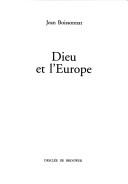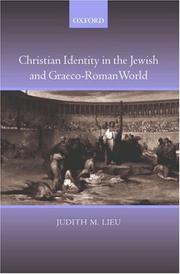| Listing 1 - 10 of 13 | << page >> |
Sort by
|
Book
ISBN: 9783429056469 3429056462 Year: 2021 Publisher: Würzburg Echter
Abstract | Keywords | Export | Availability | Bookmark
 Loading...
Loading...Choose an application
- Reference Manager
- EndNote
- RefWorks (Direct export to RefWorks)
Book
ISSN: 0920623X ISBN: 9789004298972 9789004301573 9004298975 Year: 2015 Volume: 132 Publisher: Leiden ; Boston Brill
Abstract | Keywords | Export | Availability | Bookmark
 Loading...
Loading...Choose an application
- Reference Manager
- EndNote
- RefWorks (Direct export to RefWorks)
The essays collected in Christians Shaping Identity celebrate Pauline Allen’s significant contribution to early Christian, late antique, and Byzantine studies, especially concerning bishops, heresy/orthodoxy and christology. Covering the period from earliest Christianity to middle Byzantium, the first eighteen essays explore the varied ways in which Christians constructed their own identity and that of the society around them. A final four essays explore the same theme within Roman Catholicism and oriental Christianity in the late 19th to 21st centuries, with particular attention to the subtle relationships between the shaping of the early Christian past and the moulding of Christian identity today. Among the many leading scholars represented are Averil Cameron and Elizabeth A. Clark.
Church history --- Identification (Religion) --- Identity (Psychology) --- History --- Religious aspects --- Christianity. --- 276 <082> --- Patrologie. Patristiek--Feestbundels. Festschriften --- Church history - Primitive and early church, ca. 30-600. --- Identification (Religion) - History - To 1500. --- Identity (Psychology) - Religious aspects - Christianity.

ISBN: 2220055701 9782220055701 Year: 2005 Publisher: Paris Desclée De Brouwer
Abstract | Keywords | Export | Availability | Bookmark
 Loading...
Loading...Choose an application
- Reference Manager
- EndNote
- RefWorks (Direct export to RefWorks)
Christianity --- Identity (Psychology) --- History. --- Religious aspects --- Christianity. --- Personal identity --- Personality --- Self --- Ego (Psychology) --- Individuality --- Religions --- Church history --- History --- Religious aspects&delete& --- Europe --- Church history. --- Christianity - Europe - History. --- Identity (Psychology) - Religious aspects - Christianity.
Book
ISBN: 9780812241136 0812241134 1283898969 0812207440 Year: 2012 Publisher: Philadelphia : University of Pennsylvania Press,
Abstract | Keywords | Export | Availability | Bookmark
 Loading...
Loading...Choose an application
- Reference Manager
- EndNote
- RefWorks (Direct export to RefWorks)
In Violence and Belief in Late Antiquity, Thomas Sizgorich seeks to understand why and how violent expressions of religious devotion became central to the self-understandings of both Christian and Muslim communities between the fourth and ninth centuries. Sizgorich argues that the cultivation of violent martyrdom as a path to holiness was in no way particular to Islam; rather, it emerged from a matrix put into place by the Christians of late antiquity. Paying close attention to the role of memory and narrative in the formation of individual and communal selves, Sizgorich identifies a common pool of late ancient narrative forms upon which both Christian and Muslim communities drew.In the process of recollecting the past, Sizgorich explains, Christian and Muslim communities alike elaborated iterations of Christianity or Islam that demanded of each believer a willingness to endure or inflict violence on God's behalf and thereby created militant local pieties that claimed to represent the one "real" Christianity or the only "pure" form of Islam. These militant communities used a shared system of signs, symbols, and stories, stories in which the faithful manifested their purity in conflict with the imperial powers of the world.
Violence --- Martyrdom --- Identity (Psychology) --- Martyre --- Identité (Psychologie) --- Religious aspects --- Christianity. --- Islam. --- Aspect religieux --- Christianisme --- Islam --- Identité (Psychologie) --- Christianity --- Religion --- Philosophy & Religion --- Personal identity --- Personality --- Self --- Ego (Psychology) --- Individuality --- Martyrdom (Islam) --- Muslim martyrs --- Martyrdom (Christianity) --- Christian martyrs --- Violent behavior --- Social psychology --- Violence - Religious aspects - Christianity --- Violence - Religious aspects - Islam --- Martyrdom - Christianity --- Martyrdom - Islam --- Identity (Psychology) - Religious aspects - Christianity --- Identity (Psychology) - Religious aspects - Islam
Book
ISBN: 9781107197091 9781108178242 9781316646076 1107197090 1316646076 1108187013 1108178243 1108195423 Year: 2017 Volume: 170 Publisher: Cambridge Cambridge University Press
Abstract | Keywords | Export | Availability | Bookmark
 Loading...
Loading...Choose an application
- Reference Manager
- EndNote
- RefWorks (Direct export to RefWorks)
In this book, Will N. Timmins provides a close rereading of Romans 7 within its literary-argumentative context and offers a fresh and compelling solution to the identity of the 'I' in this text. Challenging existing paradigms, which fail to provide both literary coherence and theological plausibility, he develops his own positive theory about the device. Along the way he also re-examines a number of key texts within the letter, which have hitherto not been given due weight within the scholarly discussion. This study offers a fresh and satisfying solution to one of the Bible's most notorious cruxes, and contributes to our understanding of the apostle Paul's thought. It will be of interest to all scholars and students within the fields of biblical studies and Christian theology.
Identity (Psychology) --- Religious aspects --- Christianity --- Biblical teaching. --- Bible. --- Criticism, interpretation, etc. --- 227.1*1 --- 227.1*1 Brief van Paulus aan de Romeinen --- Brief van Paulus aan de Romeinen --- Religious aspects&delete& --- Christianity&delete& --- Biblical teaching --- Personal identity --- Personality --- Self --- Ego (Psychology) --- Individuality --- Identity (Psychology) - Religious aspects - Christianity - Biblical teaching.
Book
ISSN: 25138790 ISBN: 9780567698506 0567698505 9780567698513 9780567698537 0567698513 056769853X Year: 2021 Volume: 645 Publisher: London Bloomsbury T&T Clark
Abstract | Keywords | Export | Availability | Bookmark
 Loading...
Loading...Choose an application
- Reference Manager
- EndNote
- RefWorks (Direct export to RefWorks)
"Janette Ok argues that 1 Peter characterizes Christian identity as an ethnic identity, as it holds the potential to engender a powerful sense of solidarity for readers who are experiencing social alienation as a result of their conversion. In order to help construct a collective understanding of what it means to be a Christian in contrast to non-Christians, Ok argues that the author of the epistle employs "ethnic reasoning" or logic"--
Ethnicity in the Bible. --- Identification (Religion) --- Identity (Psychology) --- Religious aspects --- Christianity. --- Bible. --- Criticism, interpretation, etc. --- Ethnicity in the Bible --- 227*22 --- 227*22 Brieven van Petrus --- Brieven van Petrus --- Identity (Religion) --- Religious identity --- Psychology, Religious --- Christianity --- Epistle of Peter, 1st --- Peter, 1st (Book of the New Testament) --- Peter (Book 1) --- Identity (Psychology) - Religious aspects - Christianity.
Book
ISBN: 9781575068145 1575068141 Year: 2011 Volume: 45 Publisher: Winona Lake Eisenbrauns
Abstract | Keywords | Export | Availability | Bookmark
 Loading...
Loading...Choose an application
- Reference Manager
- EndNote
- RefWorks (Direct export to RefWorks)
Christian life --- Identity (Psychology) --- Biblical teaching. --- Religious aspects --- Christianity. --- Bible. --- Criticism, interpretation, etc. --- 227.1*4 --- Brief van Paulus aan de Efesiërs --- 227.1*4 Brief van Paulus aan de Efesiërs --- Personal identity --- Personality --- Self --- Ego (Psychology) --- Individuality --- Biblical teaching --- Religious aspects&delete& --- Christianity --- Ebesosŏ (Book of the New Testament) --- Epheserbrief (Book of the New Testament) --- Ephesians (Book of the New Testament) --- Christian life - Biblical teaching. --- Identity (Psychology) - Religious aspects - Christianity.

ISBN: 019929142X 9780199291427 0199262896 9780199262892 0199262896 9786611198718 0191532347 1281198714 1429420219 0191602817 Year: 2004
Abstract | Keywords | Export | Availability | Bookmark
 Loading...
Loading...Choose an application
- Reference Manager
- EndNote
- RefWorks (Direct export to RefWorks)
'I am a Christian' is the confession of the martyrs of early Christian texts and, no doubt, of many others; but what did this confession mean, and how was early Christian identity constructed? This innovative study sets the emergence of Christian identity in the first two centuries, as it is constructed by the broad range of surviving literature, within the wider context of Jewish and Graeco-Roman identity. It uses a number of models from contemporary constructionist views of identity formation to explore how what comes to be seen as 'Christian' literature creates a sense of what to be 'a Christian' means, and traces both continuities and discontinuities with the ways in which Jewish and Graeco-Roman identity were also being constructed through their texts. It seeks to acknowledge the centrality of texts in shaping early Christianity, historically as well as in our perception of it, while also exploring how we might move from those texts to the individuals and communities who preserved them. Such an approach challenges more traditional emphases on the development of institutions, whether structures or credal and ethical formulations, which often fail to recognize the rhetorical function of the texts on which they draw, and the uncertainties of how well these reflect the actual practice and experience of individuals and communities. While building on recent recognition of the diversity of early Christianity, the book goes on to explore the question whether it is possible to speak of a distinctive Christian identity across both the range of early texts and as a pressing historical and theological question in the contemporary world.
Church history --- Identity (Psychology) --- Religious aspects --- Christianity. --- 27 "00/04" --- Kerkgeschiedenis--?"00/04" --- Personal identity --- Personality --- Self --- Ego (Psychology) --- Individuality --- Apostolic Church --- Christianity --- Church, Apostolic --- Early Christianity --- Early church --- Primitive and early church --- Primitive Christianity --- Fathers of the church --- Great Apostasy (Mormon doctrine) --- Religious aspects&delete& --- Christianity and other religions --- Eglise --- Identité (Psychologie) --- Christianisme --- Psychology --- Histoire --- Aspect religieux --- Psychologie --- Relations --- Primitive and early church, ca. 30-600 A.D. --- Church history - Primitive and early church, ca. 30-600 --- Identity (Psychology) - Religious aspects - Christianity
Book
ISBN: 9783161496745 3161496744 Year: 2008 Volume: 226 Publisher: Tübingen Mohr Siebeck
Abstract | Keywords | Export | Availability | Bookmark
 Loading...
Loading...Choose an application
- Reference Manager
- EndNote
- RefWorks (Direct export to RefWorks)
Christian church history --- Paul [Apostle] --- anno 1-99 --- Church history --- Identity (Psychology) --- Eglise --- Identité (Psychologie) --- Religious aspects --- Christianity. --- Histoire --- Aspect religieux --- Christianisme --- Christianity --- 281.2 --- Apostolic Church --- Church, Apostolic --- Early Christianity --- Early church --- Primitive and early church --- Primitive Christianity --- Fathers of the church --- Great Apostasy (Mormon doctrine) --- Apostolische Kerk. Judeo-christianisme:--tot einde 1ste eeuw --- 281.2 Apostolische Kerk. Judeo-christianisme:--tot einde 1ste eeuw --- Identité (Psychologie) --- Personal identity --- Personality --- Self --- Ego (Psychology) --- Individuality --- Religious aspects&delete& --- Church history - Primitive and early church, ca. 30-600 --- Identity (Psychology) - Religious aspects - Christianity
Book
ISBN: 9783161496660 3161496663 Year: 2008 Volume: 243 Publisher: Tübingen Mohr
Abstract | Keywords | Export | Availability | Bookmark
 Loading...
Loading...Choose an application
- Reference Manager
- EndNote
- RefWorks (Direct export to RefWorks)
Church history --- Identity (Psychology) --- Eglise --- Identité (Psychologie) --- Religious aspects --- Christianity. --- Histoire --- Aspect religieux --- Christianisme --- Epictetus --- Valerius Maximus --- Corinth (Greece) --- Corinthe (Grèce) --- Christianity --- 227.1*2 --- Brieven van Paulus aan de Corinthiërs --- 227.1*2 Brieven van Paulus aan de Corinthiërs --- Identité (Psychologie) --- Corinthe (Grèce) --- Personal identity --- Personality --- Self --- Ego (Psychology) --- Individuality --- Apostolic Church --- Church, Apostolic --- Early Christianity --- Early church --- Primitive and early church --- Primitive Christianity --- Fathers of the church --- Great Apostasy (Mormon doctrine) --- Religious aspects&delete& --- Corinth, Greece --- Kórinthos (Greece) --- Corinto (Greece) --- Corinthe (Greece) --- Church history - Primitive and early church, ca. 30-600 --- Identity (Psychology) - Religious aspects - Christianity
| Listing 1 - 10 of 13 | << page >> |
Sort by
|

 Search
Search Feedback
Feedback About UniCat
About UniCat  Help
Help News
News